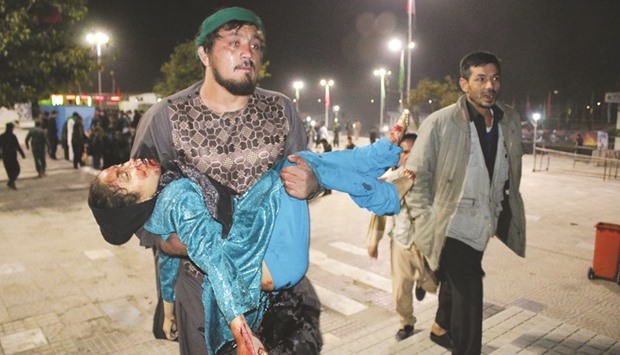At least 14 Shias were killed yesterday in a powerful blast at a mosque in northern Afghanistan, the second deadly attack on the minority in as many days during the major festival of Ashura.
“The explosion happened at the gate of the Shia mosque in the centre of Balkh district (in Balkh province),” said the provincial governor’s spokesman Munir Ahmad Farhad, adding that 14 people were killed and 28 injured.
His account was confirmed by the provincial deputy police chief.
The blast came as the Islamic State group claimed responsibility for twin attacks in Kabul on Tuesday that also targeted Shias, killing up to 18 people and wounding dozens.
Witnesses said gunmen entered the Karte Sakhi shrine near Kabul University late on Tuesday, firing indiscriminately on men, women and children as they tried to flee. The interior ministry said one was
wearing a suicide vest.
At the same time, another attacker entered a nearby mosque and took an unspecified number of people hostage as they were commemorating Ashura, the ministry said.
The UN called the attack an “atrocity” and put the toll at 18, though the interior ministry later said it was 16.
The threat of attacks on Shias was considered particularly serious during Ashura, and many foreign embassies in Kabul had restricted staff movements until the end of the week.
Ashura was marked
yesterday.
In 2011 about 80 people were killed and more than 100 wounded when a suicide bomber struck a gathering of Shiites during Ashura in the heart of Kabul.
Grieving worshippers yesterday described desperately trying to shelter their children against a hail of gunfire during the Kabul attacks.
One mother who gave her name as Saleha said of a gunman who was “killing everyone”.
She was shot in the leg as she tried to protect her child.
“While I was hugging my little son I begged him not to kill my child,” she said at a Kabul hospital.
The child survived, but she angrily denounced the Afghan government for failing to
protect them.
“The families of the president, CEO Abdullah and other rich ones live abroad. Here, only poor people are killed
every day.”
Another witness, Ali Hussain, said attackers “indiscriminately shot everyone they faced. They wouldn’t even spare women and children”.
Yesterday, the Islamic State group’s affiliate in Afghanistan and Pakistan claimed the Kabul attack, which President Ashraf Ghani condemned as a “clear sign of a crime against
humanity”.
Until recent months the group had been confined to its stronghold in eastern Nangarhar, but in July it claimed twin bombings that tore through minority Shia Hazara protesters in Kabul, killing 84 people in the deadliest attack in the capital since 2001.
Its leader Hafiz Saeed was killed in a US air strike in Nangarhar that same month, and officials have denied the July attack marked a turning point for IS in Afghanistan, saying the group has been under heavy pressure from US strikes and Afghan forces on the ground.
Sectarian attacks have been relatively rare in Afghanistan, unlike neighbouring Pakistan where violence – particularly by Sunni hardliners against the Shia minority – has claimed thousands of lives over the past decade.

An Afghan man carrying a wounded girl after an attack by gunmen at the Karte Sakhi shrine in Kabul.
